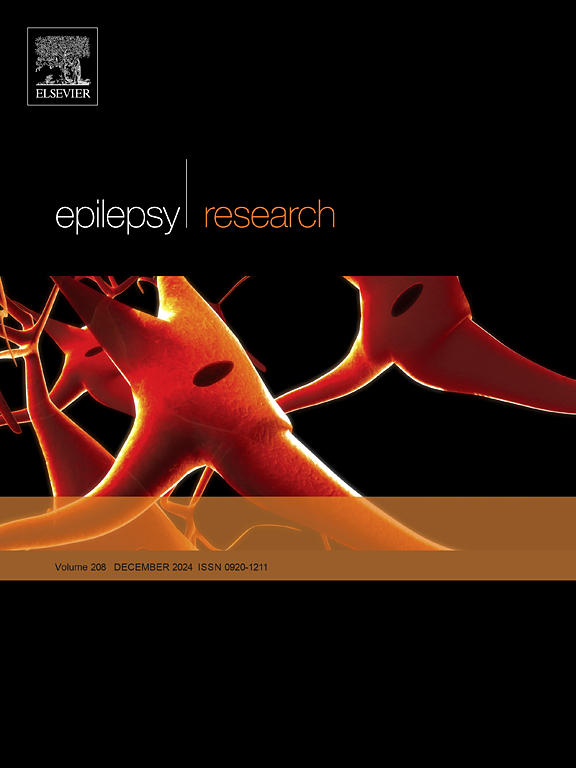Evaluation and clinical characteristics of anxiety, depression, and sleep quality among adult patients with seizure clusters
IF 2
4区 医学
Q3 CLINICAL NEUROLOGY
引用次数: 0
Abstract
Objective
This study aims to examine the clinical characteristics among seizure clusters (SCs) in adult patients with epilepsy, measure anxiety and depression symptoms, sleep quality and analyze risk factors related to these conditions while assessing their social burden.
Methods
The Generalized Anxiety Disorder-7 (GAD-7), the Neurological Disorders Depression Inventory for Epilepsy (NDDI-E), the Pittsburgh Sleep Quality Index (PSQI), and the Social Support Rating Scale (SSRS) were among the structured questionnaires utilized in Sichuan Provincial People's Hospital. Multivariate logistic regression analysis was conducted on the related differential indicators.
Results
A total of 330 adult patients with epilepsy were included. Statistically significant differences (p < 0.05) were found between the patients with SCs and without groups in terms of age at first onset, etiology, semiology distribution, imaging and EEG results, therapy, and prognosis. SC patients had significantly higher GAD-7, NDDI-E, and PSQI average total scores than in the Non-Seizure Cluster (NSC) group. (p < 0.001), and the distribution of related factors varying by age and daily seizure frequency. Patients with SCs had shown lower objective support, including material support, social networks, and group relationships than the control group
Significance
SCs are a type of clinical emergency. Patients with SCs are more susceptible to anxiety, depression, poor sleep quality and social burden, requiring proactive intervention and mental health management.
This study is registered with the Chinese Clinical Trials Registry (identifier: ChiCTR2400088157).
成人癫痫发作患者焦虑、抑郁和睡眠质量的评价及临床特征
目的探讨成人癫痫患者发作集群(SCs)的临床特征、焦虑抑郁症状、睡眠质量及相关危险因素,同时评估其社会负担。方法采用广泛性焦虑障碍-7 (GAD-7)、癫痫神经障碍抑郁量表(NDDI-E)、匹兹堡睡眠质量指数(PSQI)和社会支持评定量表(SSRS)等结构化问卷进行调查。对相关差异指标进行多元logistic回归分析。结果共纳入330例成人癫痫患者。SCs组与非SCs组在发病年龄、病因、符号学分布、影像学及脑电图结果、治疗方法、预后等方面差异均有统计学意义(p <; 0.05)。SC患者的GAD-7、ndi - e和PSQI平均总分明显高于非癫痫发作组(NSC)。(p <; 0.001),相关因素的分布随年龄和日发作频率的变化而变化。与对照组相比,SCs患者表现出较低的客观支持,包括物质支持、社会网络和群体关系。SCs患者更容易出现焦虑、抑郁、睡眠质量差和社会负担,需要积极干预和心理健康管理。本研究已在中国临床试验注册中心注册(编号:ChiCTR2400088157)。
本文章由计算机程序翻译,如有差异,请以英文原文为准。
求助全文
约1分钟内获得全文
求助全文
来源期刊

Epilepsy Research
医学-临床神经学
CiteScore
0.10
自引率
4.50%
发文量
143
审稿时长
62 days
期刊介绍:
Epilepsy Research provides for publication of high quality articles in both basic and clinical epilepsy research, with a special emphasis on translational research that ultimately relates to epilepsy as a human condition. The journal is intended to provide a forum for reporting the best and most rigorous epilepsy research from all disciplines ranging from biophysics and molecular biology to epidemiological and psychosocial research. As such the journal will publish original papers relevant to epilepsy from any scientific discipline and also studies of a multidisciplinary nature. Clinical and experimental research papers adopting fresh conceptual approaches to the study of epilepsy and its treatment are encouraged. The overriding criteria for publication are novelty, significant clinical or experimental relevance, and interest to a multidisciplinary audience in the broad arena of epilepsy. Review articles focused on any topic of epilepsy research will also be considered, but only if they present an exceptionally clear synthesis of current knowledge and future directions of a research area, based on a critical assessment of the available data or on hypotheses that are likely to stimulate more critical thinking and further advances in an area of epilepsy research.
 求助内容:
求助内容: 应助结果提醒方式:
应助结果提醒方式:


